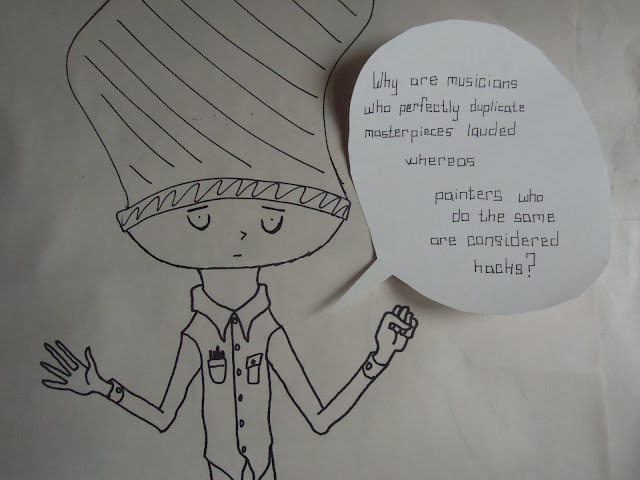If you want to be a real musician, you must have a foundation in classical music.* All other forms of music are inferior to classical music, though jazz is a very close second. Country music is for stupid people. Rap is just a lot of noise.
If you want to learn to play an instrument properly, you must take private lessons once a week and practice at least a half hour every day, though one hour is better.
Practice every piece until it is perfect. Playing a piece perfect means you do not make a mistake.
Playing music for other people is nerve-racking because you are being judged. To play all the notes in the proper order for the proper length of time means that you are a very good musician. To play all the notes in the proper order for the proper length of time
with emotion means that you are an excellent musician.** When you make a mistake it means one of two things: you are not talented enough to be a good musician or you did not practice enough.
The Chicago Symphony and the New York Philharmonic have excellent musicians because they never make mistakes. The Omaha Symphony and the St. Louis Orchestra have good musicians, but not great, because they sometimes makes mistakes and sometimes play slightly out of tune.
The most talented musicians are born with perfect pitch and become very annoyed when other musicians play out of tune.
In order to be a great musician you must always practice your scales.
Violin and piano are the hardest instruments to play. If you want to be a great violinist or pianist you must start taking lessons when you are five.
Playing in the orchestra means that you are a serious musician. Playing in the band means that you are a dork.
To hear good music, you must dress up and go to a concert hall.*** Always clap when the conductor comes out on stage. Never clap between movements.
Playing music is not the same as playing. Playing music is hard work and very good for you which means it is not a game and not meant to be fun.
The dynamic markings and accents are there to make a piece interesting and must be played how they are written.
People who listen to loud rock music have bad taste in music.
Music you just make up will not be good music unless you are a composer.
Foreign music is either boring or annoying.
Street musicians are bums.
You are either born with a good singing voice or you aren't. Never sing in public if you do not have a good singing voice.
If you are born tone deaf don't even try to play an instrument or to sing. It is possible, though, to become a great appreciator of music.
Jazz musicians improvise. Improvising means playing music without reading it off the page and is very hard to do properly. Playing jazz is fun unlike playing classical music which is serious but more rewarding.
Black people have a lot of rhythm and play jazz better than white people. Benny Goodman and Dave Brubeck are notable exceptions.
It is important to learn to play an instrument when you are growing up but not as important to continue playing it once you are an adult.
It is very difficult to learn to play an instrument when you are an adult, so don't even try.
If you don't know how to read music, you will never be a great musician, though people will be awed if you can play by ear.
It is painful to listen to people trying to play instruments they don't know how to play, therefore never play an instrument you haven't learned how to play.
*European
**Playing with emotion is an elusive thing which can not be taught.
***Jazz on the Green is the exception.















































